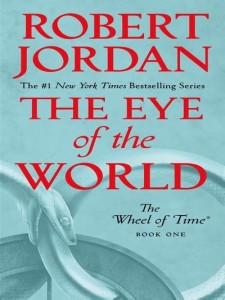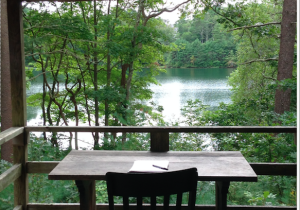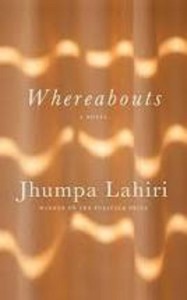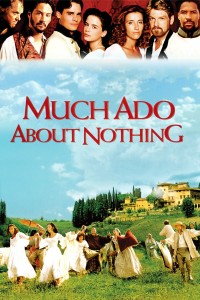
Most synopses of this book ignore the prologue, which started as a short story and was added here at the beginning of this first book in Jordan’s Wheel of Time fantasy series. Yet this was the part that grabbed my attention, centering as it does on a young woman in a world that seems similar to England in the late Middle Ages, though with some differences.
It’s Egwene’s first day being allowed to work as a water carrier during the annual sheep shearing in Emond’s Field, a town in the Two Rivers district. However, her ambition to be the best water carrier ever is derailed by her desire to see what the three young men—Rand, Mat and Perrin—are up to. The town has a mayor, who also owns the pub, but it is the Wisdom, an elderly woman, who holds the power. There are subtle signs that something is threatening this world.
As we move into the story proper, two strangers come to Emond’s Field: the mysterious Moiraine and her warder Lan. Gleeman Thom Merrilyn also turns up to entertain the town during the Winternight celebration with songs, stories, and juggling. When the town is attacked by Trollocs—creatures believed to only exist in legends—Moiraine leads the four young people and Thom on a quest to find out why their town was attacked and prevent future invasions.
While I love that women have the power in this world, what makes the story work is how each character is brought to life as their lives change and they are invited to become more than they ever thought they could be. Their individuality and the realistic character development kept me reading to find out what would happen to them.
A friend recommended the series, surprised that I’d never heard of it. There are fourteen books in the series, the last three of which were completed by Brandon Sanderson after Jordan’s death. Since each book is over 800 pages long, the series is a huge commitment.
The amount of detail Jordan has infused into this world is stunning. The world began when the Creator set a wheel in motion, such that the pattern of its seven ages repeat, but the intervals are so long, that people forget what’s happened before.
In addition to the theme of time being cyclical is the theme of how best to use power. The One Power which turns the wheel is divided into male and female halves, saidin and saidar. Unfortunately, history has shown that men who try to channel the One Power go mad and destroy everything, so now only women wield that power.
During creation the Creator imprisoned “Shai’tan,” the Dark One, but at various times his influence has escaped, so that his followers—Trollocs, Myrddraals and others—now fight to free him to take over the world.
Among many things I admire in this book is the language, particularly in dialogue. Jordan has found a way to suggest an older time without belaboring the reader with archaic diction. I need to study more carefully how he’s accomplished this, but one way is by occasionally using an obsolete word, such as scullion, while retaining the flow of our current speech patterns.
Another thing I admire is Jordan’s inventiveness, both with the detailed legends and with the dangers our protagonists encounter. Even more, I love the possibilities that open before them. And for once, the ending is perfect. I won’t give it away, but it is a model for how to handle the climax of a quest effectively, one way at least. And there are maps!
Will I read more? I don’t know if I have the stomach for fourteen books, but I may read a few more. There’s this one character I’d like to know more about.
Have you read The Wheel of Time series? What is your favorite fantasy novel?



